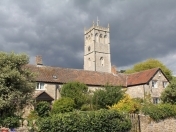
Why does Bleadon Parish Council appear to post meeting notices on its five noticeboards as an afterthought, days after it may post on its website? Why the change in public engagement?
The statement on the front of every Bleadon Parish Council agenda implies that Bleadon Parish Council is being open and transparent, yet it prefers to prioritise its website, and to delay or ignore informing residents via the its parish noticeboards. This was seen with the current November meeting notice, and recent AGAR notices from June to September. Are these the actions of an open, transparent and inclusive parish council? Does it follow best practice?
BPC agendas refer to “Openness of Local Government Bodies Regulations 2014”. The accompanying “Open and accountable local government” (detail), specifically “A guide for the press and public on attending and reporting meetings of local government” states:
”Parish and town councils ... Notice of the meeting specifying the business to be discussed must be placed in a central conspicuous place within the parish or area at least 3 clear days before the meeting (i.e. not including weekends or bank holidays) These councils are also encouraged to place copies of the agenda, meeting papers and notice of meetings at offices and on their website, if they have these facilities.”
From this guidance, for council openness and accountability to be undertaken, it appears that the noticeboards must be used, with websites only encouraged, which appears to be the opposite of current BPC practice. Parish councils do not have to have websites. This probably explains why the 'specimen job description’ for the clerk doesn’t entail any website duties (NB: BPC’s actual clerk job description has not been published, with web duties currently being undertaken by a councillor and/or an additional paid service via its web provider).
Perhaps councillors’ preference for the website may explain why noticeboards are in such a poor condition, and why the noticeboards frequently display out of date information. Saying that, the BPC website also is lacking in key information, especially with regards to meeting papers associated with both the agenda and minutes, despite best practice (ICO - Template, external auditor).
With BPC’s continued commitment to ad hoc working groups, with no TOR nor it seems published notes/minutes, the situation may only worsen - Ironic seeing as councillors set up a Communications Working group in October. It has also apparently been operating a Communication Policy since 2017, which seems to make no reference to noticeboards at all, and may explain such poor public engagement and attendance at council meetings each month. It may also explain the confusing, frustrating and unexplained meeting process for residents who wanted to speak, about their concern of the Quarry development, at the last council meeting,
---------
See also:
Government details of the 'Open and accountable local government: plain English guide'
"Transparency and openness should be the fundamental principle behind everything councils and other local government bodies do, and new rights have now been introduced by the Openness of Local Government Bodies 2014, which will enable members of the public to know how decisions are made.
These rights allow members of the public including citizens and professional journalists to:
use modern technology and communication methods such as filming, audio-recording, blogging and tweeting to report the proceedings of the meetings of their councils and other local government bodies see information relating to significant decisions made outside meetings by officers acting under a general or specific delegated power.
This guide provides practical information that will help the public to exercise their new rights under the Regulations, and what they should expect from their councils and other local government bodies." (PDF and link)



Make A Comment
Comments (0)